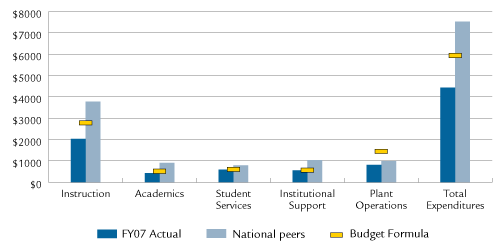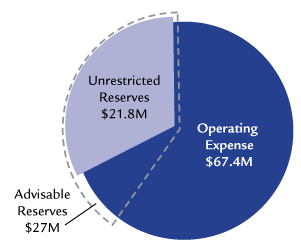Fitchburg State College
Fitchburg State College (FSC) is a comprehensive public college committed to providing affordable, life-long learning opportunities in undergraduate, graduate and continuing education. The College emphasizes the importance of leadership studies, service learning, civic responsibility, ethical development, and international education.
Program of Distinction
Collaborations
Access Indicators
Affordability Indicators
Student Success and Academic Quality Indicators
Fiscal Effectiveness and Efficiency Indicators
Program of Distinction
Fitchburg State College is proud to announce that, in July 2008, its undergraduate Computer Science and Computer Information Systems programs were accredited by ABET, Inc., the internationally recognized accrediting agency for college and university programs in applied science, computing, engineering and technology. National accreditation assures quality of academic programs by
identifying standards to which all programs are held. Fitchburg State joins Boston University, Massachusetts Institute of Technology, Northeastern University, Tufts University, Worcester Polytechnic Institute, Wentworth Institute of Technology, UMass
Amherst, UMass Dartmouth, Salem State College, and Westfield State College as an accredited four-year institution in Massachusetts.
Collaborations
- The Center for Professional Studies at FSC worked with the NAWWG-MT group, which includes the five school districts of Narragansett, Ashburnham/Westminster, Winchendon, Gardner and Monty Tech to facilitate a professional development day for all of their teachers and professional staff. Approximately 850 people attended, and the theme of the day was best practices in formative and summative assessment as it relates to differentiated instruction. FSC acted as the logistical coordinator for the day and provided two-day training to about 35 teachers and school professionals on presenting best practices to their peers.
- FSC's Center for Professional Studies (CPS) worked with an advisory group of school administrators from 10 area school districts (Fitchburg, Lunenburg, Ashburnham-Westminster, Gardner, Nashoba Tech, Quabbin, North Middlesex, Ayer, Winchendon and Narragansett) to develop online elective courses for high school students. This group was formed as a means of creating online courses available to students from these districts at a substantially reduced cost from existing options by using the teaching talent of the same districts. The FSC Distance Learning Coordinator and Director of the CPS worked closely with a group of 10 teachers interested in teaching online to prepare them to teach courses in future semesters. Two courses were piloted and offered in the fall semester of 2008: Teen Economics with 16 students enrolled, and Sports, Literature and America with nine students enrolled.
- FSC, Prescott College and the Trustees of Reservations hosted an educational symposium to examine how we can adapt our practices and choices to achieve balance with the ecological challenges we face. The event, titled "Sustainability: Preparing for a Social and Ecological Future," was the second in a series organized by FSC's Outdoor-Based Adventure Education certificate program. The target audience was college students, educators, ecologically-minded innovators, institutions and individuals who have an interest in societal practices, lifestyle approaches, "green" business practices, urban planning, resource conservation and teaching methods that will help address global and local environmental issues.
- FSC's Middle School Education Teacher Preparation Program, in partnership with Bose Corporation, provided workshops to students in the Fitchburg area. The Bose "In Harmony with Education Program," was created by Bose and the National Association for Music Education. This interdisciplinary program of science, math, and music consists of two hands-on sessions, each lasting 45 minutes. Workshops are aligned to specific Mathematics, Music (Arts), and Science and Technology Curriculum Framework Standards. One session examines the physical science of sound and includes such concepts as vibration, high pressure, and low pressure. The second session includes an exploration of how scientists analyze sound and how musicians can manipulate sound. Students also learned the basic concepts of microphone mechanics and how to analyze wave pattern.
- The Amelia V. Gallucci-Cirio Library at FSC was one of approximately 250 libraries nationwide receiving grants to offer a reading/discussion series developed by Nextbook and the American Library Association (ALA). Local support was provided by the Jewish Heritage Endowment and the Massachusetts Foundation for the Humanities. The "Let's Talk About It: Jewish Literature - Identity and Imagination" series explored Jewish literature and culture through scholar-led discussions of contemporary and classic books on a common theme. The Library's series focused on the theme Modern Marvels and included a series of graphic novels. Utilizing the Modern Marvels theme, five Jewish artists experimented with words and pictures to tell stories of childhood, war and desire; to conjure up lost worlds, both real and imaginary; and to contemplate history, myth, and the individual psyche. The series was free of charge and open to the public.
Section I: Access to Public Higher Education in Massachusetts
Access Indicators
Fall 2007 Enrollment
| Undergraduate Headcount |
3,835 |
| Undergraduate FTE |
3,297 |
| Graduate Headcount |
2,857 |
| Graduate FTE |
1,003 |
Fall Enrollment
Over the last three years, fall headcount enrollment has increased 25.3%.
Over the last three years, fall full-time equivalent (FTE) enrollment has increased 15.4%.
Annual 2007–2008 Enrollment
| Undergraduate Headcount |
4,466 |
| Undergraduate FTE |
3,375 |
| Graduate Headcount |
7,249 |
| Graduate FTE |
1,785 |
Annual Enrollment
Over the last three years, annual headcount enrollment has decreased 6.5%.
Over the last three years, annual FTE enrollment has increased 2.6%.
Looking Back: Undergraduate and Graduate Fall Headcount Enrollment

Fall 2007 Minority Enrollment
10.1%
Minority Enrollment
Comparable to the Central Region's minority representation of 9.0%.
Fall 2007 Community College Transfer Students
233
Community College Transfer Students
Over the last three years, the number of community college transfer students has remained relatively stable.
Section II: Affordability of Massachusetts Community Colleges
Affordability Indicator
2007–2008 Tuition and Fees as a Percent of Median Family Income
7.9%
% of Median Family Income
Below the Northeast regional average of 9.1%.
Looking Back: Tuition and Fees as a Percent of Median Family Income
|
FY2004 |
FY2005 |
FY2006 |
FY2007 |
FY2008 |
| Fitchburg State College Tuition and Fees |
$4,186 |
$4,588 |
$5,002 |
$5,542 |
$5,992 |
| State Median Family Income |
$67,527 |
$68,701 |
$71,655 |
$74,463 |
$78,497 |
| "X" as a Percent of State Median Family Income |
| X = Fitchburg State College Tuition and Fees |
6.2% |
6.7% |
7.0% |
7.4% |
7.6% |
| X = Massachusetts State Colleges' Average Tuition and Fees |
6.7% |
7.3% |
7.5% |
7.8% |
7.7% |
| X = Northeast Average Tuition and Fees |
|
9.2% |
9.3% |
9.3% |
9.1% |
Section III: Student Success and Academic Quality
Success and Quality Indicators
Fall 2006 Cohort First-Year Retention Rate
74.8%
Fall Cohort First-Year Persistence
Comparable to the segmental rate of 74.4% and the national rate of 73.6% but above the institutional peer retention rate of 68.1%.
Looking Back: Fall-to-Fall Retention Rate
|
Cohort |
|
Entering 2002 |
Entering 2003 |
Entering 2004 |
Entering 2005 |
Entering 2006 |
| Fitchburg State College Rate |
74.2% |
77.0% |
77.6% |
74.6% |
74.8% |
| Peer Rate |
|
70.4% |
69.3% |
69.8% |
68.1% |
| Massachusetts State Colleges Segment Rate |
74.6% |
75.2% |
76.2% |
73.5% |
74.4% |
| National Average |
|
74.3% |
74.0% |
73.7% |
73.6% |
1999–2001 Cohort Six-Year Graduation Rate (3-Year Average)
51.3%
Six-Year Graduation Rate
Above the segmental rate of 47.3% and the institutional peer rate of 40.3%.
Looking Back: Six-Year Graduation Rate
|
Cohort |
|
|
Entering 1998
Grad. by 2004 |
Entering 1999
Grad. by 2005 |
Entering 2000
Grad. by 2006 |
Entering 2001
Grad. by 2007 |
Rolling Average Entering 1999– 2001 |
| Fitchburg State College Rate |
47.1% |
54.8% |
51.6% |
47.4% |
51.3% |
| Peer Rate |
35.1% |
40.9% |
39.9% |
40.2% |
40.3% |
| Massachusetts State Colleges Segment Rate |
47.6% |
47.2% |
48.9% |
45.9% |
47.3% |
Total Degrees Conferred in FY2008
1,073
Degrees Conferred
Average degrees conferred per year over the last three years: 1,111
Looking Back: Degrees Conferred

2007 Pass Rate on the Massachusetts Test for Educator Licensure
100%
Number of Students Passing MTEL
148
Massachusetts Test for Educator Licensure Pass Rate
Above the Board of Higher Education's target pass rate of 80%.
Percent of New Students Who Were Special Admits in Fall 2007
7.7%
Special Admissions Students
Meets the Board of Higher Education requirement of enrolling less than 10% special admissions students per year. (See Appendix.)
Section IV: Effective and Efficient Use of Resources
Effectiveness and Efficiency Indicators
Effective Projects and Initiatives
- Increased grants and contracts revenue by $294,028 (8%) as compared to FY07.
- Raised $1,590,216 through private fundraising.
- Formalized Climate Action Plan to track greenhouse gas emissions and energy consumption.
- Implemented a mixed fiber recycling program resulting in recycling of 24.35 tons over a 7 month period; converted to single stream recycling resulting in 45.6 tons over a 5 month period.
- Recycled 19.69 tons of electronic computers.
Resource Allocation
Expenditures per Student—Actual, National Peers, and Budget Formula

Note: This graphic was revised on May 6, 2009. The previously posted graphic displayed the data inaccurately.
FY2008 Primary Reserve Ratio
| Unrestricted Reserves (UR) |
$21,765,206 |
| Total Operating Expenses (TOE) |
$67,425,180 |
| Primary Reserve Ratio (UR/TOE) |
32.3% |
Primary Reserve Ratio

Compliance
No materials weaknesses based on annual external independent audit:

